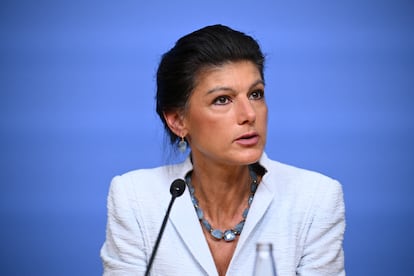Newly elected MEPs in search of a political family cause anxiety in Brussels
More than 50 new lawmakers, some of whom are openly anti-establishment, are now seeking a parliamentary group to join. Their presence could push the European Parliament even further to the right


The “o” on the “Welcome” sign at the entrance to the European Parliament is made up of the 12 stars that make up the EU flag. Behind the table, two ushers are alert to anyone who walks in looking clueless: it is likely that they are one of the many new MEPs who will be making their debut in the chamber starting next month. The idea is to help them with any doubts they may have at a time when the labyrinthine headquarters of the European Parliament in Brussels is filled with lawmakers who are coming and going, moving boxes and, above all, initiating negotiations to establish alliances and secure the main positions for the new term.
But if the newly elected MEPs have unresolved questions on their minds, they are generating many more questions among their future colleagues. Most of all, the questions revolve around the 50-odd new lawmakers classified for now as “Other.” A good number of them will probably end up in the most peripheral parties, especially on the political right, because the majority of these newcomers defend disruptive ideas.
They are arriving without sponsors, as they say in Brussels slang, that is to say, without any direct connection with one of the seven political families that make up the bulk of the chamber. The rest do not belong to any family or have been expelled. This is what happened in the previous term to the 13 lawmakers from Fidesz — the party of Hungarian Prime Minister Viktor Orbán — who were asked in 2021 to leave the European People’s Party (EPP).
Although the so-called traditional pro-European groups — EPP, the social democrats of S&D and the liberals of Renew — together have enough representation to guarantee a comfortable majority if they manage to reach an agreement, the extremist forces have acquired so much weight that these balances are more precarious than ever. Each seat counts, if possible, more than ever before. These “other” lawmakers generate anxiety due to their capacity to break the increasingly fragile balances now in place. This group will disappear when the first session of the new European Parliament is held on July 16. By then, anyone who is not in a political family will end up as “Non-Inscrits” or non-attached to one of the recognized political groups.
There are more than reasonable doubts whether Renew, which has dropped from 102 seats to 79, will be able to maintain its position as the third force in Parliament, since the European Conservatives and Reformists (ECR) — with far-right members such as the Brothers of Italy and Spain’s Vox — currently have 73 and, if they manage to attract some of these newly arrived lawmakers, they could take that third place.
And there are more candidates than ever who could generate this kind of disruption in Brussels: currently, the European Parliament has classified 55 lawmakers as “others.” In 2019, there were only 31.

Among those who generate the most doubts are the newcomers not only to Brussels, but to politics itself, such as Spain’s Alvise Pérez, a self-styled anti-establishment and anti-corruption crusader who has been convicted of spreading fake news on the internet and who has openly acknowledged that he ran for office in Europe to seek immunity from prosecution. And then there is the Cypriot YouTuber Fidias, who at 24 years of age has a record number of followers on social media, 2.6 million, and who readily admits to having no idea about European political issues.
New German left-wing populist group
But having political experience does not always serve to dispel doubts. Just ask the six new MEPs from Germany who are representing the new group led by Sahra Wagenknecht, the charismatic politician who left the post-communist party Die Linke to found her own populist party, with which she has achieved better results in Brussels. This confrontation raises doubts, since it will be very difficult for Die Linke, which is active in the European family of The Left, to allow Wagenknecht’s MEPs to sit in their group. On the other side of the political spectrum, there are several “others” such as the Romanian ultranationalists of AUR (five MEPs) whose pro-Russian position could block their way in a family led by Giorgia Meloni, who has accepted the pro-Ukraine position of the EU Twenty-Seven.

The thing is, it is not enough for a MEP to want to enter a political family; the latter also has to accept the applicant. Both parties have to communicate this desire in writing to Parliament before being formally registered in a given group. If they do not succeed, MEPs may end up in the group of non-attached members, which in the previous term included 62 lawmakers.
Few people want to end up in that undefined group, and with good reason: only if you belong to a political family can you aspire to institutional positions (such as vice-presidencies or committees), be part of decision-making meetings, or even have more speaking time. And if there is one thing that everyone in the EU Parliament wants, it is to be heard from the loudspeaker that is Europe.
Sign up for our weekly newsletter to get more English-language news coverage from EL PAÍS USA Edition









































